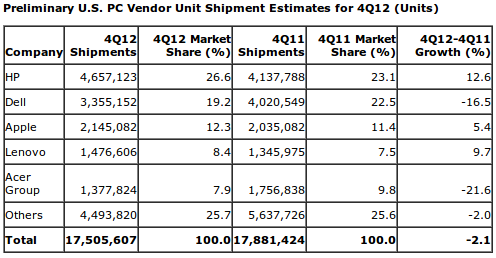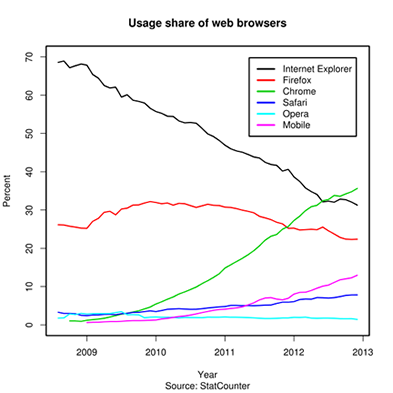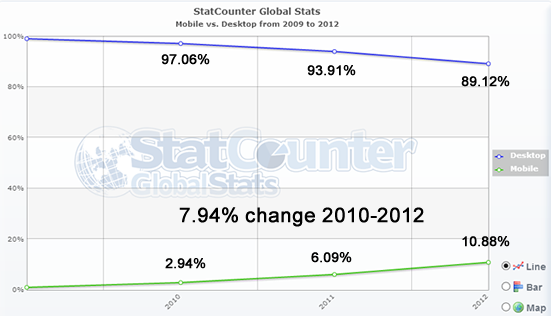The PC is dying? My own customers prove just the contrary
 There's an excellent debate raging on the front pages of BetaNews for the past few weeks, and it's a topic that I feel quite entrenched in. Seeing as my computer repair business FireLogic deals with customers of all types on a daily basis, I thought I should drop my own two cents in on the subject. Joe Wilcox has argued the death knell for the PC is just about here, while a few others, like Wayne Williams (and myself), dispute the notion with quite the vigor.
There's an excellent debate raging on the front pages of BetaNews for the past few weeks, and it's a topic that I feel quite entrenched in. Seeing as my computer repair business FireLogic deals with customers of all types on a daily basis, I thought I should drop my own two cents in on the subject. Joe Wilcox has argued the death knell for the PC is just about here, while a few others, like Wayne Williams (and myself), dispute the notion with quite the vigor.
I think this topic deserves some definite attention because there seems to be a perception out there that the rise in mobile devices such as tablets, smartphones and the like will completely eradicate the traditional PC. It's a touchy topic for my colleagues in the computer repair industry, and something that is frequently debated on the forums of a website dedicated to "our kind" over at Technibble.com.
Like many computer repair businesses, I've had to come to the realization that being multi-faceted is the only way to survive. The field of computer repair has changed drastically in just the past five years or so, and not because of the decline of the PC per se. The truth of the matter is simply that computer lifespans are longer today due to better hardware, better operating systems (yes, Windows 8 even surpasses 7 in my book), and more unused processing power that newer machines come with, idly unused for the front half of their ownership. Whereas customers of mine were getting 3-4 years out of machines back in the early 2000s, they now push their PCs to 4-6 year replacement cycles without much sweat.
Getting by these days just by offering traditional desktop/laptop repair is not possible -- at least in our suburban Chicagoland area in the USA. But we're a company of many faces today, being knee deep in offering Office 365 and Google Apps consulting, handling networking/WiFi, and many other new-age technologies that go beyond the traditional scope of shop-based computer repair. Our industry is evolving rapidly and keeping up is just the name of the game.
While my own opinion stands directly opposite that of the PC obituary writers such as Wilcox, I have also observed the trends on purchasing and usage of my own customer base. Our company deals with a healthy mixture of residential, commercial, educational and some nonprofit customers alike and we are often the first point of reference for this crowd when they make buying decisions.
I fully admit that the acceptance of tablets and smartphones has been on a steady rise for the past two years. But I think we are mistakenly equating tablet/smartphone uptake with a direct drop in PC/laptop ownership. That, I say, is complete malarkey. Consumption is wonderfully handled on a 4-inch phone or 7-inch tablet, but none of my customers has dumped their PCs to go mobile full time. And I know exactly why.
We're in a PC Plus Era, not a post-PC Era
As exciting and fresh as the mobile era is, it ain't replacing the traditional PC (whether it be desktop, laptop, ultrabook -- whatever your chosen flavor of the day) anytime soon. There are a few hard reasons I can point to, and they are:
- Consumers are merely supplementing their computers, not replacing them, with tablets/smartphones.
- Browser usage statistics continue to paint a PC dominant picture, even throughout the majority of 2013 and beyond.
- Sales numbers for new PCs alone don't tell the whole story, as modern computers last longer.
Much of this is merely a logical progression in the evolution of modern computing, just like many other products we rely on in daily life. When microwaves came out, we flocked to them because they made simple, short cooking tasks that much quicker. Yet I can't name a single person who got rid of their traditional oven in place of one. The same goes for anyone who purchases a scooter for their daily commute to work. Cutting down on gas costs is great, but you wouldn't dump your car unless you live in the heart of a big city. The same can be said for our new-found affection for tablets and smartphones.
I personally do a lot of email and browsing on my Blackberry 9810. It comes with my line of work. But would I dump my PC in favor of just the phone? I doubt it -- and no, an Android or iPhone wouldn't change my answer. It's because while I'm on the go, a smartphone makes sense. However, in the comfort of my office or home, the smartphone gets put aside and my trusted ThinkPad laptop is the only computing device I'd choose to spend anything more than 30 minutes on. In my view, non-mobile computing on a regular computer just makes sense.
And judging from my own observations of customers' habits, they tend to be in the same boat. Yes, a decent minority of them have purchased tablets such as iPads or Nexus devices, but they haven't eliminated their PCs in any way. They turn to their tablets and smartphones for the short-burst email responses or to spend a few minutes browsing the news, but when Microsoft Office isn't functioning, I'm still the first one to hear about it.
As odd as it sounds, some of these same customers even claim to have lost love for their tablets. Some of them had no idea that typing for extended periods on a touch screen was just that difficult (and they find bluetooth keyboards a hassle and pesky.) A few have mentioned that their tablets serve them no real purpose outside of using cool apps, which eventually wore off. And so the tablets now sit unused in drawers, while they go back to their laptop or desktop routine.
Some may call this a perception dilemma from before the purchase was made. I think some of it has to do with a media "hype bubble" on what niche mobile devices serve and what their real purpose in your bag or pocket is.
Modern Computer Hardware and OS Software lasts Longer
Do I have formal numbers to back this up? No, I'll leave that to the so-called tech analysts. But if the trends I see in my day-to-day work with computer repair customers are right, it's that modern computers (Windows Vista and newer) stick around longer. I'm only talking a few years longer, but for a PC industry that was built around the 2-3 year upgrade cycle, this is a shocking development for all sides involved.
Customers who dragged out Windows XP machines for more than five years avoided upgrading due to financial or other concerns. Now, a Windows Vista or newer PC could likely run on for five, six, seven or possibly more years without much issue. And this is the untold trend that I see in my customer base. Solid, secure operating systems installed onto well-engineered computer hardware equals a darn long system life.
Another factor playing into this reality is the fact that computer hardware manufacturers, starting with the chip outlets like AMD and Intel to the hard drive powerhouses of Seagate and WD, have been including exponential amounts of unused overhead for the past half decade. Let's be real here: the difference between a PIII and P4 processor for everyday computing were vast. Compared to the difference between a Core 2 Duo and Core i5? Not so much (note: I'm speaking about everyday computing, not gaming/CAD/etc.)
And the unused overhead extends to hard drives (how many average people will fill a 1TB hard drive in three years?) all the way down to memory (8GB of memory for browsing the news and typing letters? Quite the overkill if you ask me). Whereas ten years ago we had to spend extra in every corner of a new PC to get the performance we needed, these days it's the exact opposite. In most cases the average shelf PC from Dell or Lenovo will be enough for you to get your work done for the next five years, and then some as a hand-me-down for the kids.
The evolution of Windows is having just as much effect on this longevity question, in my opinion. Windows XP, while good for its era, quickly started to show its edges in terms of security and performance limitations. Excluding the mess that Windows Vista made, Windows 7 and now 8 are quite exemplary in getting more bang per byte than was ever possible. Not only are they dozens of times more secure than a standard Windows XP machine, but seeing as both of these modern OSes can be easily installed onto Windows XP-era hardware is a proof of concept within itself.
Every way I look, to my own computing needs and the patterns among my customer base, I see a fleet of modern computers that are outliving their brethren's lifespans without much effort. And this directly correlates with sales figures that are portraying a twisted landscape in the PC vs Tablet/Smartphone discussion.
PC sales don't tell the Whole Story
In a recent article on this topic, Joe Wilcox displayed some numbers provided by Gartner & IDC that explain the abysmal sales atmosphere of the PC landscape. I'll pop one of those tables up, just for discussion's sake:

The worldwide numbers for PC shipments were down 4Q 2012 compared to 4Q 2011 by a larger margin, coming in at -4.9 percent, but the US numbers tell a similar tale (as shown above). If you believe in two of the main points that I discussed above, then a lot of this tends to make more sense. Individuals who already own newer computers aren't purchasing again this time around because their machines last longer, but also because they're now dumping money into companion devices to offload some of their consumption onto.
Ah yes, the PC Plus era starts to make a little more sense. Just like we complimented our kitchens with microwave ovens, we're now adorning our daily lives with a greater need for mobile, handheld devices for quick need-based consumption. And this is exactly why sales numbers alone won't tell the whole story: if computers are lasting longer on average, and we need fewer of them per household, then raw sales figures alone will of course be skewed towards a "post-PC", hello-mobile belief.
Yet the numbers aren't as grim as we make them out to be. While total shipments for the USA were down a mere 2.1% quarter-for-quarter, there were more than a few bright spots on the map. HP came out with a 12.6 percent increase, and Lenovo posted a similar 9.7 percent bump year over year. Even Apple enjoyed a small but decent 5.4-percent bump. Dell and Acer have been on the decline for a few years now, so their drops aren't as shocking as they may seem.
Browser Usage Numbers show little Sway towards Mobile
I think a better determining factor of how devices are being used in daily life is to measure against a usage area that is near and dear to most peoples' hearts: web browsing. So heavy is the claim that mobile is overtaking the PC, we might not need computers anymore for our daily lives. But judging from what the browser usage statistics show, the PC is far from dead and merely cohabiting with consumers' new mobile devices in this landscape.
Here's one graph, thanks to Wikipedia, that was put together by StatCounter, a web usage research outlet:
 In the purple color above, we can see the slow rise by mobile device browsing happening through the end of 2012, but the rise is far from dramatic. In fact, it shows mobile browsing creeping just over 10 percent with deep sags shown by Internet Explorer and Firefox alike. However, look at the runaway pony in this race -- Google Chrome of all items! In fact, Chrome trounced the gains made in the mobile arena by nearly 4 times over.
In the purple color above, we can see the slow rise by mobile device browsing happening through the end of 2012, but the rise is far from dramatic. In fact, it shows mobile browsing creeping just over 10 percent with deep sags shown by Internet Explorer and Firefox alike. However, look at the runaway pony in this race -- Google Chrome of all items! In fact, Chrome trounced the gains made in the mobile arena by nearly 4 times over.
You may say, well, that's because replacing a software program is easier than switching your browsing habits to a mobile device. But isn't that the argument at stake here, that mobile is going to crush desktop usage soon? If these numbers indicate anything, it's that the desktop is still alive and strong. At this rate, mobile needs to continue its 4-percent increase in usage year after just to hit 50/50 parity with desktop usage in the next decade.
Looking at the broader picture, mobile vs desktop usage on a worldwide scale shows very similar results. Here is another StatCounter graphic pitting the two head to head for a timespan of 2009 to 2012:

Again, I ask where we see this post-PC landscape residing because it surely doesn't prove itself on these graphs. Sure, a near 8-percent jump in web browsing by mobile devices worldwide over two years is sizable, but I am fairly confident these numbers will plateau as we reach a level where the market is saturated with "complimentary" devices, not "replacement" devices. The mobile landscape seems to be growing at a steady 3-4 percent per year which is good, but nothing that will usher in the demise of the PC anytime soon.
What does the Future hold? I can't say, but the PC will still be a Part of It
Some people may get away with using a tablet exclusively, as our own Joe Wilcox is going to attempt to prove. And some, likewise, may find that their smartphone can handle a majority of their consumption browsing. But the average user, at least the one I serve in my own day-to-day line of technology consulting, has yet to come to any rash idealistic conclusion of a post-PC era. At the end of the day, no matter how flashy or light their mobile device is, it's their desktop/laptop they are turning to in order to comfortably get their computing tasks done.
I think some new devices blur the line between traditional PC and new-age mobile devices quite well. Some of my favorites, which I've positively opined about in the recent past, are the Chromebook and Surface from Google and Microsoft, respectively. I personally believe that people still have an attachment to the ease that a traditional keyboard provides, and they still want to be a part of the touch era, too.
For the foreseeable future, I think the computer as we know it will still be around and the platform of choice for most average consumers. Until the day where I can whip out documents as quickly and easily as on my laptop, with the comfort of a tactile keyboard and big screen, will I even consider converting myself over to the post-PC era. Because if the iPad and Nexus are the definition of post-PC, I'll gladly sit this evolution out.
Photo Credit: Peter Bernik/Shutterstock
 Derrick Wlodarz is an IT professional who owns Park Ridge, IL (USA) based computer repair company FireLogic. He has over 7+ years of experience in the private and public technology sectors, holds numerous credentials from CompTIA and Microsoft, and is one of a handful of Google Apps Certified Trainers & Deployment Specialists in the States. He is an active member of CompTIA's Subject Matter Expert Technical Advisory Council that shapes the future of CompTIA examinations across the globe. You can reach out to him at [email protected].
Derrick Wlodarz is an IT professional who owns Park Ridge, IL (USA) based computer repair company FireLogic. He has over 7+ years of experience in the private and public technology sectors, holds numerous credentials from CompTIA and Microsoft, and is one of a handful of Google Apps Certified Trainers & Deployment Specialists in the States. He is an active member of CompTIA's Subject Matter Expert Technical Advisory Council that shapes the future of CompTIA examinations across the globe. You can reach out to him at [email protected].